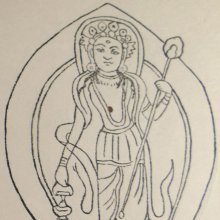Harivahana, Harivāhana, Harivāhaṇa, Hari-vahana: 11 definitions
Introduction:
Harivahana means something in Buddhism, Pali, Hinduism, Sanskrit, Jainism, Prakrit. If you want to know the exact meaning, history, etymology or English translation of this term then check out the descriptions on this page. Add your comment or reference to a book if you want to contribute to this summary article.
Images (photo gallery)
In Hinduism
Purana and Itihasa (epic history)
Source: Cologne Digital Sanskrit Dictionaries: The Purana IndexHarivāhana (हरिवाहन).—A son of Caidyoparicara.*
- * Matsya-purāṇa 50. 27.

The Purana (पुराण, purāṇas) refers to Sanskrit literature preserving ancient India’s vast cultural history, including historical legends, religious ceremonies, various arts and sciences. The eighteen mahapuranas total over 400,000 shlokas (metrical couplets) and date to at least several centuries BCE.
In Buddhism
Tibetan Buddhism (Vajrayana or tantric Buddhism)
Source: archive.org: The Indian Buddhist IconographyHarivāhana (हरिवाहन) or Harivāhanalokeśvara refers to number 82 of the 108 forms of Avalokiteśvara found in the Machhandar Vahal (Kathmanu, Nepal). [Machhandar or Machandar is another name for for Matsyendra.].
Accordingly,—
“Harivāhana also is identical with [Piṇḍapātra Lokeśvara], with the difference that here the god carries the Kamaṇḍalu in his right hand and the chowrie in his left.—Piṇḍapātra Lokeśvara is one-faced and two-armed and stands on a lotus. He holds the Piṇḍapātra (the bowl) in his two hands near the navel”.
The names of the 108 deities [viz., Harivāhana] possbily originate from a Tantra included in the Kagyur which is named “the 108 names of Avalokiteshvara”, however it is not yet certain that this is the source for the Nepali descriptions. Tibetan Buddhism includes schools such as Nyingma, Kadampa, Kagyu and Gelug. Their primary canon of literature is divided in two broad categories: The Kangyur, which consists of Buddha’s words, and the Tengyur, which includes commentaries from various sources. Esotericism and tantra techniques (vajrayāna) are collected indepently.
In Jainism
General definition (in Jainism)
Source: archive.org: Trisastisalakapurusacaritra1) Harivāhana (हरिवाहन) is the name of an ancient king from Ratnapura, according to chapter 4.7 [sanatkumāra-cakrin-caritra] of Hemacandra’s 11th century Triṣaṣṭiśalākāpuruṣacaritra: an ancient Sanskrit epic poem narrating the history and legends of sixty-three illustrious persons in Jainism.
Accordingly:—“[...] In course of time he (Agniśarman) became a three-staved ascetic and went to the city Ratnapura, devoted to severe penance of two months, etc. Harivāhana was the king in that city. He was a Vaiṣṇava and he heard that an ascetic had come. At the time for breaking his fast, he was invited by the king and went to the palace. By chance he saw Jinadharma. Then because of the hostility of a former birth, the Ṛṣi, red-eyed from anger, spoke to King Harivāhana whose hands were joined (respectfully):[...]”.
2) Harivāhana (हरिवाहन) is the name of an ancient king from Mathurā, according , according to the Jain Ramayana and chapter 7.2 [Rāvaṇa’s expedition of conquest].—Accordingly, “[...] Destroyer of Marutta’s sacrifice, strong like the wind, he went then to the city Mathurā, very powerful. Its king, Harivāhana, came to Daśagrīva with his son Madhu, who had a spear, like Īśāna. Daśakandhara, delighted, talked with him who was standing near with devotion and asked him, ‘Where did your son get this spear for a weapon?’ Madhu, instructed by his father by a gesture of his eye-brow, replied gently: ‘[...]’”.
3) Harivāhaṇa (हरिवाहण) is the name of an ancient king, according to the Jain Ramayana and chapter 7.4 [Rāma and Lakṣmaṇa].—Accordingly, “Maithila (Janaka) and Aikṣvāka (Daśaratha) wandering together, united, in the same condition, friends, went to the north country. They heard of a svayaṃvara of Kaikeyī, the daughter of King Śubhamati in the city Kautukamaṅgala, borne by Pṛthvīśrī, sister of Droṇamegha, a depository of the seventy-two arts, and they went to the pavilion. They sat down on the platform in the midst of the kings headed by Harivāhaṇa, like haṃsas on a lotus. [...]”.

Jainism is an Indian religion of Dharma whose doctrine revolves around harmlessness (ahimsa) towards every living being. The two major branches (Digambara and Svetambara) of Jainism stimulate self-control (or, shramana, ‘self-reliance’) and spiritual development through a path of peace for the soul to progess to the ultimate goal.
Languages of India and abroad
Sanskrit dictionary
Source: DDSA: The practical Sanskrit-English dictionaryHarivāhana (हरिवाहन).—
1) Garuḍa.
2) Indra.
3) Name of the sun. °दिश् (diś) f. the east; अलकसंयमनादिव लोचने हरीत मे हरिवाहनदिङ्मुखम् (alakasaṃyamanādiva locane harīta me harivāhanadiṅmukham) V.3.6.
Derivable forms: harivāhanaḥ (हरिवाहनः).
Harivāhana is a Sanskrit compound consisting of the terms hari and vāhana (वाहन).
Source: Cologne Digital Sanskrit Dictionaries: Shabda-Sagara Sanskrit-English DictionaryHarivāhana (हरिवाहन).—m.
(-naḥ) 1. Garuda. 2. Indra. E. hari Vishnu, or the horse of Indra, and vāhana a vehicle.
Source: Cologne Digital Sanskrit Dictionaries: Benfey Sanskrit-English DictionaryHarivāhana (हरिवाहन).—m. 1. Garuḍa. 2. Indra, [Indralokāgamana] 5, 54.
Harivāhana is a Sanskrit compound consisting of the terms hari and vāhana (वाहन).
Source: Cologne Digital Sanskrit Dictionaries: Cappeller Sanskrit-English DictionaryHarivāhana (हरिवाहन).—[adjective] guiding the fallow steeds; [masculine] [Epithet] of Indra.
Source: Cologne Digital Sanskrit Dictionaries: Monier-Williams Sanskrit-English Dictionary1) Harivāhana (हरिवाहन):—[=hari-vāhana] [from hari] m. ‘Viṣṇu-bearer’, Name of the bird Garuḍa, [cf. Lexicographers, esp. such as amarasiṃha, halāyudha, hemacandra, etc.]
2) [v.s. ...] ‘having bay horses’, Name of Indra, [Mahābhārata; Rāmāyaṇa]
3) [v.s. ...] of the sun, [cf. Lexicographers, esp. such as amarasiṃha, halāyudha, hemacandra, etc.]
Source: Cologne Digital Sanskrit Dictionaries: Yates Sanskrit-English DictionaryHarivāhana (हरिवाहन):—[hari-vāhana] (naḥ) 1. m. Garuḍa.
[Sanskrit to German]
Sanskrit, also spelled संस्कृतम् (saṃskṛtam), is an ancient language of India commonly seen as the grandmother of the Indo-European language family (even English!). Closely allied with Prakrit and Pali, Sanskrit is more exhaustive in both grammar and terms and has the most extensive collection of literature in the world, greatly surpassing its sister-languages Greek and Latin.
Nepali dictionary
Source: unoes: Nepali-English DictionaryHarivāhana (हरिवाहन):—n. Mythol. 1. the name of the bird; the vehicle of Vishnu; 2. the Sun; 3. Indra;
Nepali is the primary language of the Nepalese people counting almost 20 million native speakers. The country of Nepal is situated in the Himalaya mountain range to the north of India.
See also (Relevant definitions)
Partial matches: Vahana, Hari.
Starts with: Harivahanadish, Harivahanalokeshvara.
Ends with: Harihariharivahana.
Full-text: Harivahanadish, Harihariharivahanasadhana, Dinmukha, Jyotishmati, Shrikumara, Harivahanalokeshvara, Prithvishri, Kautukamangala, Kanakaprabha, Madhu, Shubhamati, Shatadvara, Prabhava, Dronamegha, Parivarta, Kaikeyi, Sumitra.
Relevant text
Search found 5 books and stories containing Harivahana, Harivāhana, Harivāhaṇa, Hari-vahana, Hari-vāhana; (plurals include: Harivahanas, Harivāhanas, Harivāhaṇas, vahanas, vāhanas). You can also click to the full overview containing English textual excerpts. Below are direct links for the most relevant articles:
Trishashti Shalaka Purusha Caritra (by Helen M. Johnson)
Part 8: Marriage with Kaikeyī < [Chapter IV - The, birth, marriage, and retreat to the forest of Rāma and Lakṣmaṇa]
Part 2: Previous births of Sanatkumāra as Jinadharma and of Asitākṣa as Agniśarman < [Chapter VII - Sanatkumāracakricaritra]
Part 12: Conquest of Mathurā < [Chapter II - Rāvaṇa’s expedition of Conquest]
The Indian Buddhist Iconography (by Benoytosh Bhattachacharyya)
Ramayana of Valmiki (by Hari Prasad Shastri)
Chapter 9 - Hanuman searches the Harem < [Book 5 - Sundara-kanda]
Mahabharata (English) (by Kisari Mohan Ganguli)
Section XLVI < [Indralokagamana Parva]
The Skanda Purana (by G. V. Tagare)
Chapter 60 - Mataṅgeśvara (mataṅga-īśvara-liṅga) < [Section 2 - Caturaśīti-liṅga-māhātmya]

